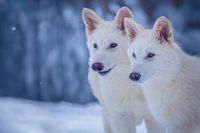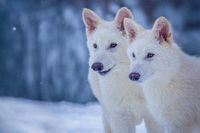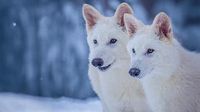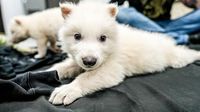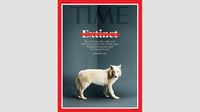Colossal Biosciences has made history by successfully resurrecting the dire wolf, a species that has not roamed the Earth for over 10,000 years. On April 7, 2025, the Texas-based biotech company announced the birth of three dire wolf puppies, named Romulus, Remus, and Khaleesi, in a groundbreaking achievement that combines gene-editing and cloning technology.
The announcement, which coincided with a feature in Time magazine, highlights Colossal's mission to bring extinct species back to life. The dire wolves were born to surrogate large hound mixes in a secluded 2,000-acre ecological preserve, carefully monitored by a dedicated team of veterinarians and animal care professionals. Romulus and Remus, the twin brothers, were born in October 2024, while Khaleesi, named after the popular character from HBO's Game of Thrones, was born a few months later.
Colossal’s CEO Ben Lamm expressed immense pride in the team’s accomplishment, stating, "I could not be more proud of the team. This massive milestone is the first of many coming examples demonstrating that our end-to-end de-extinction technology stack works." The company used DNA from a 13,000-year-old tooth and a 72,000-year-old skull to create the puppies, showcasing a remarkable blend of ancient genetics and modern science.
Dire wolves (Aenocyon dirus) were formidable canines that lived during the Late Pleistocene, evolving to hunt large megafauna like ground sloths and bison. They went extinct around 9,500 years ago, likely due to competition from other canids and changing environmental conditions. The dire wolf's distinct features include a larger body size, wider heads, and more robust teeth compared to modern gray wolves, their closest living relatives.
Colossal's scientists undertook a meticulous process to resurrect the dire wolf. They extracted ancient DNA from fossilized remains and sequenced it to identify key genetic traits. After determining that the dire wolf genome differs from that of the gray wolf by approximately 0.5%, or about 12 million base pairs, the team made precise edits to the DNA of gray wolf cells. In total, they performed 20 edits across 14 genes to create embryos that were implanted in surrogate mothers.
The result is a trio of pups that exhibit traits reminiscent of their ancient ancestors. Romulus and Remus are expected to weigh around 140 pounds when fully grown, making them 20 to 25 percent larger than their gray wolf counterparts. They currently thrive on a diet of beef, deer, and horse meat, along with specially formulated kibble. Their behavior has been distinctly lupine, shunning human interaction and displaying cautious, alert instincts characteristic of wild wolves.
However, this accomplishment has sparked ethical debates within the scientific community. Critics question the wisdom of reviving extinct species and the potential ecological consequences of reintroducing them into modern ecosystems. Karl Flessa, a paleontologist at the University of Arizona, remarked, "It’s better to prevent extinctions in the first place, rather than bring back bio-replicas whose ‘reintroduction’ may have a host of unintended consequences."
Despite these concerns, Colossal is undeterred in its mission. The company has also announced the successful cloning of four critically endangered red wolves, which are among the rarest canids in the wild. With only 17 to 19 red wolves remaining in their natural habitat and around 270 in captivity, this effort highlights the company's commitment to conservation.
Colossal Biosciences, founded in 2022, has garnered significant attention and investment, boasting a valuation of approximately $10 billion. Its ambitious plans include not only the resurrection of the woolly mammoth by 2028 but also the potential de-extinction of other species, such as the dodo bird and the Tasmanian tiger. Lamm emphasizes that their work transcends mere spectacle, aiming to enhance biodiversity and contribute to advancements in health care.
The resurrection of the dire wolf marks a significant milestone in the field of de-extinction, raising questions about humanity's role in shaping the future of biodiversity. As scientists continue to explore the implications of this groundbreaking work, Romulus, Remus, and Khaleesi stand as living testaments to the possibilities of genetic engineering.
As the world watches Colossal's next steps, the arrival of these dire wolves serves as a reminder of the delicate balance between innovation and ethics in the pursuit of scientific progress. The journey of these pups, from ancient DNA to modern existence, encapsulates the complexities of restoring what once was lost.
